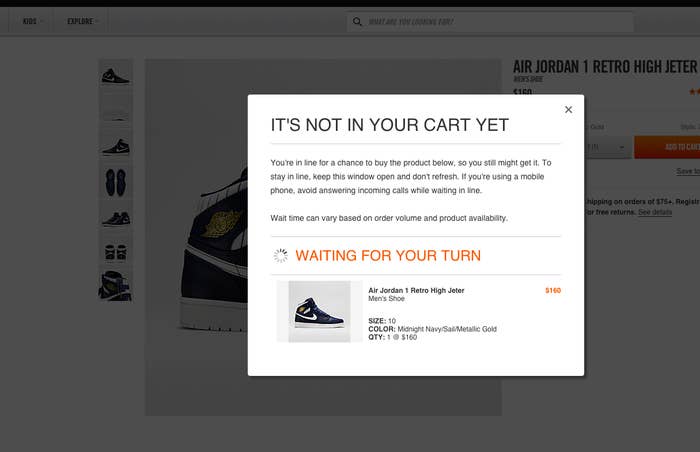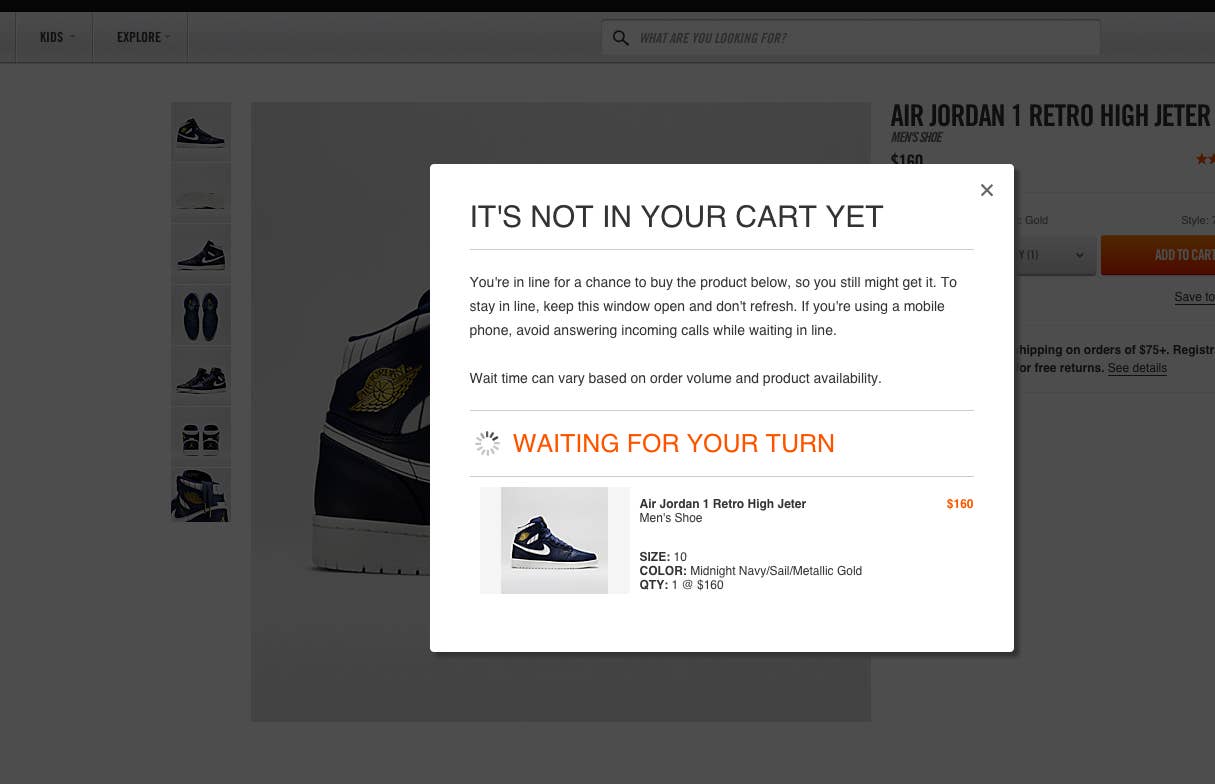
Opinions reflected here are purely that of the author.
I was in the office late last night, as I am wont to do, and as 7 o’clock approached, I realized it was nearing the time for the Derek Jeter Air Jordan 1 re-launch on Nikestore. I’ve long since given up on purchasing “launch” product online, but what the hell. I pulled up the page, which had an actual live countdown, and waited. When the clock hit zero and sizes appeared, I put my size 10 in the cart, clicked to check out, and got a screen that those more patient—and positive—than I must see all too often: IT'S NOT IN YOUR CART YET, WAITING FOR YOUR TURN.
WHEN A SINGLE PAIR OF SNEAKERS FROM A COUPLE OF YEARS AGO CAN FETCH UPWARDS OF $5,000, WHY WOULDN’T UNSCRUPULOUS CHARACTERS GET INVOLVED?
After roughly six minutes, the wheel stopped spinning, and a new message replaced the quasi-hopeful one—SOLD OUT. Of course. But hey, it’s not like I was buying the Jeters to actually wear them. They’re currently on Flight Club for $750 plus, and roughly $500 profit for a few minutes of “work” was too good to pass up.
I won’t go so far as to say anyone who doesn’t consider sneakers a commodity is stupid—but almost everyone who doesn’t consider sneakers a commodity is stupid. The parallels are all there. We have a stock report in sites like Campless, and every new “limited” release is essentially an IPO, as those who get in at the retail level stand to make immediate profits. Buy a pair of sneakers for $160 and immediately sell them for $750? You’d have to be stupid (or wealthy) not to. After all, there’s always something else to wear. Is it any wonder why people are creating bots or cleaning out retailers?
Make no mistake, it’s not only sneakers. Everything is a commodity now. Steiner Sports “celebrated” Jeter’s final year by selling everything they could attach his name to, from bases to socks. Everything is treated as some kind of investment. Why should sneakers be any different? And when sneaker companies realized that they could sell sneakers as more than something you wear then throw away, well, profits were potentially limitless. We, of course, bought in. Instead of two or three pairs of sneakers, now it’s normal to own a dozen or a hundred (or hundreds), kept in clear plastic boxes and displayed like treasures.
Pretty much every single problem people have with sneakers have stemmed from this. Fakes? Resellers? Bots? Those are all symptoms of the same disease. None of it should be all that surprising. When a single pair of sneakers from a couple of years ago can fetch upwards of $5,000, why wouldn’t unscrupulous characters get involved? Easy money is blood in the water, and the sharks are everywhere. Eventually, of course, someone will kill the golden goose, because that always happens, too. Remember the baseball card market? Beanie Babies? Or, for that matter, the Nike SB one?
Somewhere along the line, sanity will have to prevail. Things—whether they are actual items or stock—that are overvalued always fall back to where they’re supposed to be. And a sneaker that costs $20 to produce, retails for $150 and sells for $1,000 is certainly overvalued by any estimation. It’s only “rare” because a company chooses to make it so, not because of age or any sort of natural process. The valuation, as it were, is more or less completely arbitrary and completely insane. All it will take is a few key people who are willing to pay the top of the market now to realize how insane it all is.
The good thing is that this mentality only really affects a fairly small percentage of all the sneakers sold. It’s still possible to get gems for cheap, whether they be new ones that go on clearance or vintage examples on eBay, and I still think that all in all this is a great time to be into sneakers. Custom programs have made individual expression universally attainable, and tons of new releases drop every single week. The key to all of this is simply knowing which ones to buy—and which ones to sell.
Russ Bengtson is a senior staff writer at Complex. He doesn’t have Yeezy 2s but would totally sell them for $5,000 if he did. Follow him on Twitter here.

